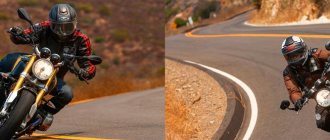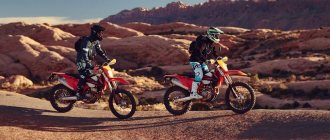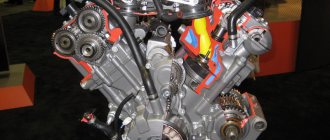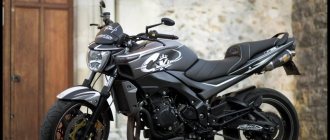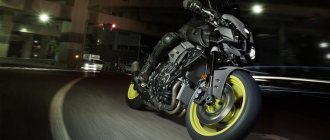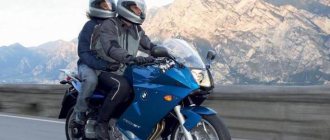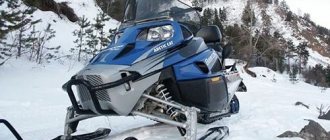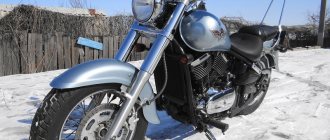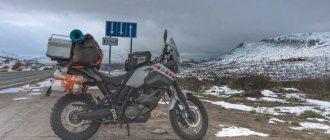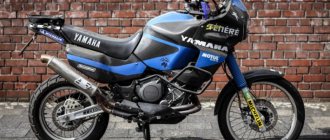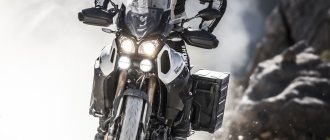Yamaha XT1200Z SUPER TENERE is a motorcycle model that combines functional beauty and reliable advanced technology. This touring bike was first demonstrated in 2010 at a motorcycle exhibition in the German city of Dortmund. Yamaha, having released the XT1200Z SUPER TENERE, announced that it was going to create a series of SUVs. When developing the design, engineers first started with a powerful engine. The layout of the in-line two-cylinder unit made it possible to create this motorcycle as narrow and compact as possible. Features such as durable wheels and engine protection made the vehicle comfortable and practical for long trips. Some of the key things that engineers have built into the design are mass centralization and a lower center of gravity, making the vehicle easy to hold and control. XT1200Z SUPER TENERE has advanced technical characteristics, which include: • electronic throttle control system; • ABS system; • the ability to use the bike as a road or touring bike; • electronic suspension; • three-channel integrated braking system; • exclusive Yamaha traction control system and others. You can enjoy riding this motorcycle for a long time, as the fuel tank capacity is 23 liters. The height of the motorcycle windshield can be adjusted without using tools. In combination with the low deflector, ride comfort is maximized even on highways. The seating position is comfortable and the seat is adjustable in two positions, making it suitable for long trips. The aluminum handlebars on the motorcycle are wide and bend towards the driver. The design uses a powerful motor. It has different settings modes - sport and universal, which is convenient when operating motorcycles in off-road conditions and asphalt surfaces. The XT1200Z SUPER TENERE is equipped with a suspension that is electronically tuned. The suspension can also be controlled manually by switching the device to this mode. This vehicle from Yamaha is characterized by such characteristics as versatility, quiet operation and high power. Every year this motorcycle is gaining more and more popularity, as it performs well when driving on the highway and off-road.
Bike features
Here are the main features of the Yamaha XT 1200 Z Super Tenere:
- stylish, modern design;
- comfortable fit;
- good driving characteristics.
In the city, on the highway, and in the wild, this bike will be a reliable assistant. You can put enough luggage on the car to travel comfortably across countries and continents, let alone move from one region to another.
Review of the Yamaha XT1200Z Super Tenere motorcycle
Let’s just say that I’ve been waiting for it for a very long time, somewhere since 2009, when only photos of the concept appeared. At that time I was riding a Suzuki Bandit 1200S, I really liked the motorcycle, but for Russian roads I wanted something with long-travel suspensions.
And finally, in the spring of 2011, I saw it in the salon. I was lucky the first year in Russia the motorcycle was sold in the First Edition configuration, and this meant side cases, engine protection, headlight protection, and a 12V socket for free.
A short note about the panniers from the owner of Tenere.. and the XTZ1200 has the same panniers, I’ll say that the panniers are 4+
+ (who noticed)
1. completely dismountable
2. quite strong
3. lungs
4. design class.
- (again IMHO)
1. lock, very strong force on the key, I have already broken one, and have already ordered larvae with keys from ebay.
2. The saddlebag fastenings suffer from falls; for example, one of mine cracked...
3. The elastic band that is put on the bottom of the pannier and is attached to the motorcycle at this point does not sit securely when removing the panniers, do not forget to put it away somewhere.
The fact that there was a lot of force on the key also confused me greatly. The downside for me was that they are very narrow, although on the other hand this is a plus. Also, because they are square, they are very convenient for attaching luggage. Plus, you can also transform the passenger seat.
While I was waiting for spring, I was thinking hard about how to protect my motorcycle from falls. By the way, the motorcycle already comes stock with some good sliders. But the soul demanded arcs! After researching many bourgeois sites, I found the following: Original + SW motech price 300 euros + 160 euros.
I rode the first kilometers on the Super Tenere. My height is 190 cm, weight is about 100 kg. All small asphalt irregularities are absorbed unnoticeably, and small vibrations are felt on uneven surfaces such as speed bumps. Stability on rough roads is good. It feels like roads were repaired everywhere this spring, and well (of course, this is not true, unfortunately). The weight disappears after 15 km/h, steering is good and easy, probably due to the wide steering wheel. I was pleased with the combined braking system; the motorcycle does not nod off, but settles down completely. Because of the inverted fork, it is better not to install a lock on the front disc; you can break the front fender if you forget to remove it.
The instrument panel is easy to read, it is a pity that all the instrument panel buttons are not located on the steering wheel controls, at least the info button. The ambient temperature sensor lies when you stand still, it greatly overestimates if there is no airflow. It’s convenient that it shows the consumption, instantaneous and average, when you turn on the reserve, it begins to count the kilometers that you drive on reserve.
In touring mode you don’t feel the volume of 1200 cc, but when you switch to sport mode the engine immediately shows itself. The engine is high-torque, at low speeds you can feel the kicks of the 2-cylinder engine. Especially in sport mode at low speed.
The wind protection is good, with a standard piece of glass at speeds up to 60-80 you can keep the visor on without much wind. The passenger does not complain about the wind either. Thanks to the protection on the steering wheel, your hands don’t get too cold, you need to install heating, but you can live without it. I would have frozen long ago on the classics.
For now I drive with a lowered seat. The seating position is free and straight, you sit as if on a throne, high at the level of large jeeps. In the aisle it is more convenient with a low saddle to reach the ground, since with panniers there are gaps of several centimeters between the cars, you can’t tilt it much. It’s a bit difficult in traffic jams with side panniers.
The sound is bassy and rich and quite loud. I don't see any point in changing the exhaust. The motor is noisy. There are vibrations compared to the inline four, but they are not particularly bothersome.
The side step is annoying, it’s not convenient to pull it out, the lever has to be moved between the step and the speed foot, but you can get used to it. But the foot at the footrest is quite wide. Also with panniers you need a good stretch to throw your legs over the saddle without kicking the pannier.
I appreciated the light last night. The low beam is uniform and bright, the high beam also illuminates everything around. There is enough light, I won’t install xenon. Maybe I'll add more foglights later.
Without side panniers you can get through traffic jams, the steering wheel is high, a lot of things pass underneath.
Car mirrors can go below your mirrors and steering wheel, but above your panniers.
Regarding the dynamics and box on the super tenner:
Gear shifts clearly, neutral is easy to find. The gears after the road driver (Suzuki GSF 1200) are a bit short, when starting from a traffic light you need to work faster with your foot, but overall it’s enough. When shifting down and releasing the clutch, the rear wheel will skid and no ABS or TCS will help here.
I think I understand the system for opening and removing panniers. Before opening, you need to press a little on the lid, turn the key, and lift the lid. By the way, I already drove with the case open and didn’t seem to lose anything, even on broken asphalt. By the way, I’m used to the fact that on road bikes the side panniers are visible in the corner of the mirror, but here it’s not possible to set it up like that 
I drove a super tener along the Moscow-Saratov-Balakovo spring highway for 1050 km. The pimp fits perfectly under the broken asphalt. Cruising speed 120-140. In reality, you can drive 170 without straining, but it’s expensive and there’s no point, you’ll talk to the police more and in the end you’ll drive longer.
Average consumption per trip is 5.6 liters of 95 gasoline. The tank lasts for about 400 km, I was driving in sport mode. I turned off the touring mode almost immediately; the throttle response was too smooth. It is probably convenient to use in the rain. In touring mode, I think the consumption will be a little less. In the city, by the way, my average consumption was around 7.5 liters.
The wind protection is excellent, with the saddle and glass raised, the wind flows little into the lower part of the helmet’s air intake, I’ll probably lower the glass, I love it when it blows. I couldn’t think of a single complaint about the saddle and seating; there was no desire to change my position during the entire trip. Everything is in its place. The saddle is wide and large. My ass wasn’t tired; in fact, sometimes I was too lazy to stop again. Stopped only to refuel and take a leak.
Driving on broken asphalt is even more interesting than on smooth ones; when entering the Saratov region, the phone mount on the steering wheel was shaken off. It is necessary to install competent aluminum fasteners, not Chinese plastic ones. It is not convenient to use the HTC Desire phone as a GPS in the sun; the brightness is not enough and there is glare. I used Navitel, it was convenient. During the time I warned about turns (though I already knew the road well) and that it was convenient to squeak where the limits were 40 or 60, when I exceeded them too much. And he didn’t interfere with listening to music from his phone at the same time, he spoke over the music (via Scalarider).
As I understand it, the standard bug of 1200 engines is a constant search for seventh gear. It would not be a bad idea to install a light for the last gear.
The result was 1050 km in 12 hours, at a calm pace. On a bandit, on such a broken road, it would take one and a half times longer and would be twice as tired. I am very pleased with the motor, just what we need for our roads.
I noticed an unpleasant thud when revving up on some bumps. At first I thought the plastic had come loose somewhere, I looked through everything and couldn’t find it. Over 150 km the sound progressed very much and began to radiate into the steering wheel on all bumps. When carefully swinging the fork, I thought that I would have to tinker with the fork or bearings for a long time.
It turned out that it was easier to unscrew the nut above the yoke; it screws the upper yoke with the steering wheel and stays to the steering column. Tightened it and put it on the thread locker. Once again you can drive over speed bumps with pleasure. Perhaps we should convey our warm regards to the mechanics from Trinity Sports who assembled the motorcycle. According to the manual, this nut is tightened with a force of 130 Nm.
I drove along a wet clay road on standard road tires. It's hard to travel. It constantly tries to slip and crash into the mud, due to the heavy weight and high center of gravity. It is easier to control the gas and rear wheel drift than with an inline four.
I took a ride on a pimp a month ago to test drive a Yamaha. Which, by the way, was terribly organized. Well, that's not what we're talking about.
The first thing that really surprised me was how easily it steers. The motor is controlled almost by the power of thought - the effort on the steering wheel is minimal. As it turned out later, this applies to the entire class (BMW and Honda have the same thing). No other class of motorcycle gives such pleasure and comfort from taxiing as a tourenduro - it’s so easy and pleasant to do it.
I also remember this: the site during that test drive was dirty - there was gravel and sand on the asphalt. Before the pimp, I drove a couple of laps around it in an XJ6 road bike, and it was very unpleasant: constantly thinking about how not to crash the bike on all this garbage, and feeling all the bumps. And when I switched to a pimp, it all disappeared: no irregularities and excitement. Mot holds the road rooted to the spot, and walks along it very smoothly, stably, and pleasantly. It's like she doesn't have all this garbage on her. This is where the pleasant moments of the pimp end, and the disadvantages begin.
Firstly, this is the engine. He is very sad - inert, thoughtful, weak. And it also makes a lot of all sorts of left noises - some kind of grinding, clattering. And for him this is the norm. And it’s unpleasant for the rider. In general, the pimp's engine is the lamest in the class, and with a huge lag behind its competitors.
Secondly, this is the driveshaft - it’s also bad and unpleasant for the pimps, just like the engine. He has very large gaps - he is all sort of slack. Together with the thoughtful engine, we come to the conclusion that every time the gas is opened and closed, the motor twitches unpleasantly due to these backlashes. In general, it’s not a bad idea.
Next: the saddle. It is, of course, much more convenient than on road cars and motards, but worse than on BMW and Honda. I can’t say for sure (because I didn’t ride the pimp a lot, and didn’t pay much attention to the saddle), but, in my opinion, he has some kind of problem with his shape. I see that Yamaha's saddles are in general trouble.
The pimp also has a very strange design with radiators located on the sides of the tank. Those. Any serious off-road fall can leave you with a busted radiator. Is it normal at all??? This is where Yamaha engineers were thinking?
In conclusion about the pimp, I want to say that this is a clear outsider of the class in all respects. Initially, he didn’t turn out to be very successful, and with the advent of competitors (who are all 2-3 years younger than him), the pimp immediately became obsolete. So Yamaha needs to radically update it as soon as possible if it wants to compete on equal terms with other players in the class. Because now the pimp is not their competitor at all.
Dimensions and weight
The length of this bike reaches 2255 mm, its width is 980 mm, and the total height is 1410 mm. As for the height of the saddle, it can be adjusted in the range from 845 mm to 870 mm. The tank volume reaches 23 liters, which, of course, is good: after all, this is a touring enduro. The bike will consume from 5.5 liters to 7 liters of gasoline per hundred kilometers.
Chassis and brakes
The exterior of the model looks just great: a modern, stylish steel frame, beautiful spoked wheels, a comfortable, practical steering wheel, and stylish wind protection. Everything about the motorcycle is done at the highest level. The combination of colors was also tastefully chosen: bright purple and black.
The rear suspension is a pendulum version with a monoshock absorber. At the front there is an inverted fork, the dimensions of which are 43 mm. The rear brake is represented by a 282 mm disc and a two-piston caliper. At the front there are a pair of 310 mm discs with four-piston calipers.
Summary
All in all, there are two different but distinct motorcycles under one common name. Excellent, but very different! The Yamaha Super Tenere 1200 is a niche model in a niche segment, a faster and asphalt-oriented tourenduro than most of its rivals, while also being more off-road than, for example, the Versys 1000. And a wide range of tuning options allows you to refine off-road or, on the contrary, asphalt qualities according to to your taste and mood. Its engine is absolutely excellent for any long journey, it is powerful and predictable, it will not let you down on the longest journey and will not punish you for a mistake due to fatigue at the end of a long day.
Yamaha Tenere 700 is simple, fun and wild. There are also a lot of options and accessories for it, allowing you to equip it completely for yourself. It is quite capable of becoming a more road model without losing its off-road qualities, but making the 1200 as light and all-terrain as the 700 is almost impossible. Therefore, choosing between them is very simple: if you plan to go off-road, then it makes sense to consider the Tenere 700. If we are talking about asphalt tourism with a number of dirt roads and nearby exits from them, the Super Tenere 1200 would be the ideal choice.

